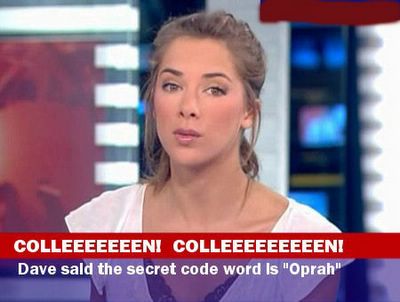Too Much Television??
Someone's been watching a little too much television, me thinks.
Letterman Lawyers Fight Restraining Order
SANTA FE, N.M. - Attorneys for television talk show host David Letterman want a judge to quash a restraining order granted to a Santa Fe woman who contends the celebrity used code words to show that he wanted to marry her and train her as his co-host.
A state judge granted a temporary restraining order to Colleen Nestler, who alleged in a request filed last Thursday that Letterman has forced her to go bankrupt and caused her "mental cruelty" and "sleep deprivation" since May 1994.
Nestler requested that Letterman, who tapes his show in New York, stay at least three yards away and not "think of me, and release me from his mental harassment and hammering."
Nestler's application for a restraining order was accompanied by a six-page typed letter in which she said Letterman used code words, gestures and "eye expressions" to convey his desires for her.
She wrote that she began sending Letterman "thoughts of love" after his show began in 1993, and that he responded in code words and gestures, asking her to come East.
She said he asked her to be his wife during a televised "teaser" for his show by saying, "Marry me, Oprah." Her letter said Oprah was the first of many code names for her, and that the coded vocabulary increased and changed with time.
Her letter does not say why she recently sought a restraining order.



1 Comments:
Certainly the woman is crazy, but is there any truth to her claim?
What the general public does not realize, is that all broadcast stations and many specific television shows are playing the Mooks and shearing the Sheeple.
Every broadcast network tries to collect as much information as possible from the public, about its programs. There are many ways that this is done. Numerous television shows will also separately collect, analyze and use feedback from the public. Every word of every letter or email sent to a television station or program is scrutinized. Details as to likes and dislikes are gleaned, and the information is used to provide direction, as well as develop new material. Personal anecdotes from the viewers are captured and the core messages of these mini stories are likely to be incorporated into the show.
This is referred to as reflecting. Reflecting back to the fans, that which they divulge in their communiqués. It is a strategy very similar to the ‘cold reading’ technique performed by tarot card readers. The Mark is not aware of how much they are revealing, or to what purpose their entanglement might be used.
There are practical reasons for generating and perpetuating communications with viewers. It is difficult to know public sentiment while preoccupied with a daily show. Anything the public has to say may be used in creating content. It is difficult to continually come up with new ideas and things to say without regular input from the audience, as well as other sources. It is easy to become stale in a relatively brief period of time and the ratings will immediately reflect it.
However the application of such practices can and does lead to collateral damage. The Mark or Mook is being lead-on. There are ample teasers in the form of buzzwords, gestures and visuals which are intended to excite the interested person or persons. Instigation, antagonism and other forms of provocation are often used to whip up the target. Taking their cue from ubiquitous good cop bad cop scenes, the program creators push whatever buttons they can detect.
Creating conflict between a show and individuals or certain groups or other shows is all part of hightening the drama. It contributes to creating a sense of edginess which translates into ratings and dollars. The dance they dance can be dangerous for mentally unstable individuals, from within the viewing public.
The cast members and writers of sophisticated daily television programs share ideas and information. They collaborate. Writers who work for multiple programs bring with them the knowledge and ideas generated by their other gigs. The friendships that develop among members of different shows, mostly on the same network, are used to assist each other in various ways, such as promoting each other’s projects and programs and playing the Mooks.
It is all part of creating buzz, and it is easy for the dramatis personae and crew to transgress. The heady buzz created in the pursuit of ratings and dollars makes it easy to break ethical standards. Unfortunately for an unsuspecting few, the fantasy of television can become their reality and the result is devastating. The only real question that remains is whether the network programs are culpable, or not.
By Anonymous, at
11:53 AM
Anonymous, at
11:53 AM
Post a Comment
<< Home